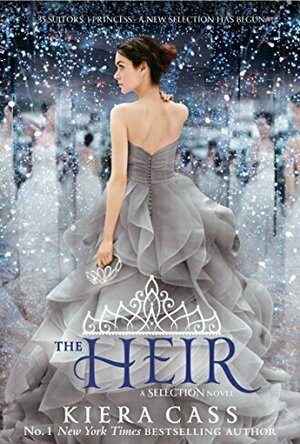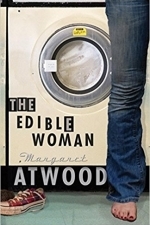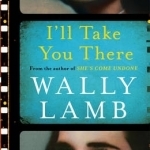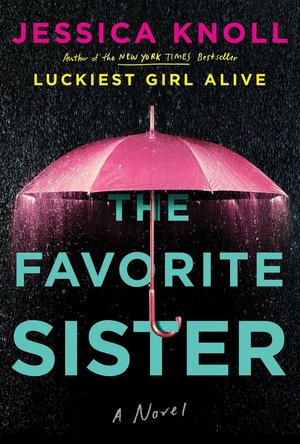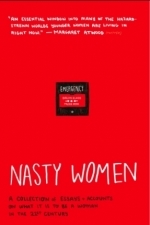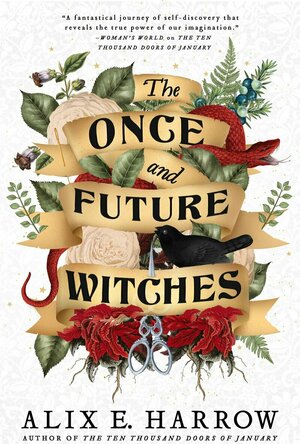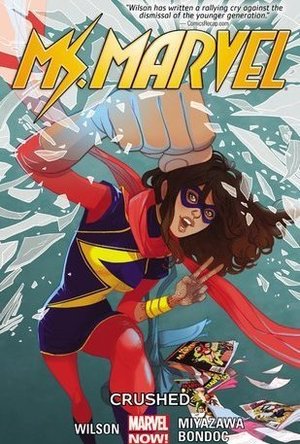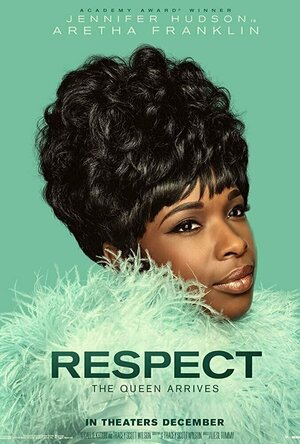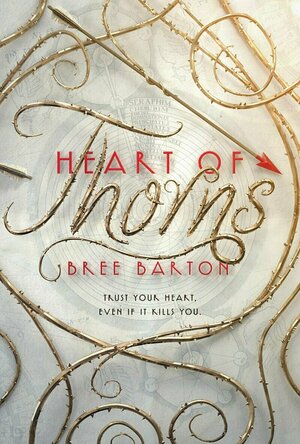Search
Eleanor Luhar (47 KP) rated The Heir (The Selection, #4) in Books
Jun 24, 2019
This is the fourth novel in The Selection series by Kiera Cass. Twenty years after the Selection which led to the marriage of America and Prince Maxon, this book follows their eldest daughter, Eadlyn. As the older twin, she is destined to inherit the throne instead of her brother. She's been preparing herself for the role since birth, and had every intention of doing so alone. But when the removal of the caste system fails to satisfy the public, it's clear that a distraction is required. Reluctantly, Eadlyn agrees to take part in a Selection herself - but she's certain she will not end up with a husband.
Much like her mother, Eadlyn's attempt to avoid affection towards the candidates is futile; she actually finds herself feeling friendship (or more) to several of the boys she meets. Still, she tries to remain distant - romance was always her brother Ahren's thing.
The twins are as close as is possible, but Eadlyn finds herself fearing the loss of him. He's been deeply in love with the French heir for a while, and Eadlyn's attempt to separate them backfires drastically. And then, on top of everything, their mother falls ill suddenly. Finally, Eadlyn begins to realise the importance of this Selection.
The reluctance to actually engage in the Selection was very similar to America in the first book. Too similar, maybe. And the change of heart followed the same pattern, too. But maybe it won't end in love this time. (I'll have to read the next book and find out!)
Eadlyn's quite a "typical" feminist sort of figure - believing she will be the best Queen without any husband around. But Ahren makes a fantastic point, saying she's able to fall in love and have a beautiful wedding and love fashion and flowers while still being the strong, brave Queen she is inside. To me, that's what feminism is truly about. It was nice to see this view - from a boy, nonetheless - challenging the original view of Eadlyn.
Also, Eadlyn is a very strong, blunt girl most of the time - her way of being strong is, often, being rather rude. And eventually, she actually sees that in herself and realises that maybe she doesn't have to be that way to be powerful and successful. Her admiration (and jealousy) of Ahren's girlfriend also confirms this; she's a petite, gentle girl, but is taken seriously by everyone around her. She is not harsh like Eadlyn, yet she is not taken for granted by anyone. A girl can be beautiful and feminine, yet still be a powerful authoritative figure.
Although it was pretty similar to the first book, I still did enjoy it. And Eadlyn's attraction to so many suitors means that this could go any way, so I do look forward to finding out who she will end up with - if anyone. This series has always been really enjoyable and easy to read. 4 stars for The Heir.
Much like her mother, Eadlyn's attempt to avoid affection towards the candidates is futile; she actually finds herself feeling friendship (or more) to several of the boys she meets. Still, she tries to remain distant - romance was always her brother Ahren's thing.
The twins are as close as is possible, but Eadlyn finds herself fearing the loss of him. He's been deeply in love with the French heir for a while, and Eadlyn's attempt to separate them backfires drastically. And then, on top of everything, their mother falls ill suddenly. Finally, Eadlyn begins to realise the importance of this Selection.
The reluctance to actually engage in the Selection was very similar to America in the first book. Too similar, maybe. And the change of heart followed the same pattern, too. But maybe it won't end in love this time. (I'll have to read the next book and find out!)
Eadlyn's quite a "typical" feminist sort of figure - believing she will be the best Queen without any husband around. But Ahren makes a fantastic point, saying she's able to fall in love and have a beautiful wedding and love fashion and flowers while still being the strong, brave Queen she is inside. To me, that's what feminism is truly about. It was nice to see this view - from a boy, nonetheless - challenging the original view of Eadlyn.
Also, Eadlyn is a very strong, blunt girl most of the time - her way of being strong is, often, being rather rude. And eventually, she actually sees that in herself and realises that maybe she doesn't have to be that way to be powerful and successful. Her admiration (and jealousy) of Ahren's girlfriend also confirms this; she's a petite, gentle girl, but is taken seriously by everyone around her. She is not harsh like Eadlyn, yet she is not taken for granted by anyone. A girl can be beautiful and feminine, yet still be a powerful authoritative figure.
Although it was pretty similar to the first book, I still did enjoy it. And Eadlyn's attraction to so many suitors means that this could go any way, so I do look forward to finding out who she will end up with - if anyone. This series has always been really enjoyable and easy to read. 4 stars for The Heir.
Jamie (131 KP) rated The Edible Woman in Books
May 24, 2017
An honest exploration of the roles of women, marriage, and entering adulthood
Marian is an average college-educated woman who lives with a roommate in a decent apartment, works for a survey company, is moderately good looking, and has a handsome fiancé who is on his way to being a big shot lawyer. It sounds like life altogether is going pretty well for Marian. Yet for some reason she feels empty, why?
The Edible Woman explores the themes of losing a sense of self with maturity. At work she is pushed around, her roommate Ainsley is inconsiderate, the landlady is judgmental, and her boyfriend Peter is self centered and makes snide comments at Marian’s expense, acting like he can barely tolerate her. With each encounter Marian puts aside her pride for the sake of avoiding conflict. Marian expresses her problems through eating, or the lack thereof, hinting at a potential eating disorder. Just as she feels inhibited in life, she suddenly feels inhibited with the kinds of food that she can eat.
As the story continues she begins to dread marriage and question the direction her life is going—becoming just as listless as her friend and former classmate Clara, who after marriage and three pregnancies just seems beaten down. Marian’s fiancé Peter is the stereotypical perfect bachelor: a man’s man that looks down on women and views marriage as a ball and chain. Peter pushes Marian around in order to mold her into a subservient woman. There is no longer any room for her thoughts, her feelings, or her desires from under his shadow.
But what about work? What are women’s roles in society and the work force? Throughout the story there are several women including Marian with college educations, yet none of them really have a stable career. Women are expected to be wives and mothers, there’s simply no time for an education or a job. In this case, their educations are ultimately viewed as their downfall due to the crushing reality of how little opportunity they would have. This was the very sad truth at the time the book was written and thankfully is not exactly the case now in most parts of the world.
Atwood tackles a large number of social issues throughout the book that I think would be important for any young woman. Adulthood, relationships, marriage, the choice between work and education versus starting a family, and lastly feminism—both good and bad. (Hint: Ainsely is a perfect example of a bad feminist.)
There are certain elements of the book that are becoming quite dated. Namely the typewriters, the social expectation that all women can be are housewives, and the limited ways that women can dress; These things might make it difficult for young women to look past and relate to the main character. Despite this the book is still incredibly relevant in the message that it brings about maintaining one’s individuality. I absolutely love this book and found a lot of my former self in it’s pages.
The Edible Woman explores the themes of losing a sense of self with maturity. At work she is pushed around, her roommate Ainsley is inconsiderate, the landlady is judgmental, and her boyfriend Peter is self centered and makes snide comments at Marian’s expense, acting like he can barely tolerate her. With each encounter Marian puts aside her pride for the sake of avoiding conflict. Marian expresses her problems through eating, or the lack thereof, hinting at a potential eating disorder. Just as she feels inhibited in life, she suddenly feels inhibited with the kinds of food that she can eat.
As the story continues she begins to dread marriage and question the direction her life is going—becoming just as listless as her friend and former classmate Clara, who after marriage and three pregnancies just seems beaten down. Marian’s fiancé Peter is the stereotypical perfect bachelor: a man’s man that looks down on women and views marriage as a ball and chain. Peter pushes Marian around in order to mold her into a subservient woman. There is no longer any room for her thoughts, her feelings, or her desires from under his shadow.
But what about work? What are women’s roles in society and the work force? Throughout the story there are several women including Marian with college educations, yet none of them really have a stable career. Women are expected to be wives and mothers, there’s simply no time for an education or a job. In this case, their educations are ultimately viewed as their downfall due to the crushing reality of how little opportunity they would have. This was the very sad truth at the time the book was written and thankfully is not exactly the case now in most parts of the world.
Atwood tackles a large number of social issues throughout the book that I think would be important for any young woman. Adulthood, relationships, marriage, the choice between work and education versus starting a family, and lastly feminism—both good and bad. (Hint: Ainsely is a perfect example of a bad feminist.)
There are certain elements of the book that are becoming quite dated. Namely the typewriters, the social expectation that all women can be are housewives, and the limited ways that women can dress; These things might make it difficult for young women to look past and relate to the main character. Despite this the book is still incredibly relevant in the message that it brings about maintaining one’s individuality. I absolutely love this book and found a lot of my former self in it’s pages.
Whatchareadin (174 KP) rated I'll Take You There in Books
May 10, 2018
Felix Funicello is a film professor who lives in Connecticut. He is divorced and has one daughter, Eliza, who is currently working for New York Magazine. Felix also has two older sister, Simone and Frances who are an integral part of his life. Felix hold a movie club on Monday nights in the old Vaudeville theater in town. One night as he is setting up, he is visited by the ghost of Lois Weber, a renowned film director in her time. Lois shows Felix glimpses of his life along with the important women in it. Through these snapshots, Felix gains a greater understanding of the women in his life and women in general.
This book was reminiscent to A Christmas Carol, but he is visited by the same ghost, who brings three different visitors with her. Felix is first returned to his six year-old self. Where he and his sisters are helping their neighbor gather votes to become the next Rheingold Girl. Rheingold is a beer. This happens after his daughter tells him she has to write a piece about these girls.
The next transportation is a few years later when Felix is twelve. His mother and sister are talking in the kitchen about her boss being inappropriate with her at work. This part I heard just a few days after hearing day after day about a new man in a high position has been removed because of inappropriate behavior in the work place. Mind you, this is taking place in the early '60s and times were different, but some things never change. As Eliza, is telling her mother about what her boss has said, it's the mother's response that truly strikes me.
<i>"Men are men. Shapely girls like you just have to put up with stuff like that in the working world or else quit. Those are your choices."</i>
Thank God, those are no longer our choices, and that shouldn't have been the mentality then, maybe we wouldn't have all these issues today.
Also during this trip, Felix is given some news about his family that will change the dynamic forever.
The final time Lois comes to visit, the guest she brings, gives Felix a testimony that he has wondered about in the back of his mind for most of his life. That helps to fill a missing piece. The story is sad and is a part of the two previous visits from Lois.
All of these visits help Felix to be a better man, brother and father to the women in his life.
I think this is a very important book for all women to read, especially with the things going on in our world today. Told from the male point of view, I think it helps to see that some men can be empathetic to the plights of women. And this books covers a lot of those plights, from feminism, to abortion, adoption and acceptance. Years ago, I read She's Come Undone by Wally Lamb and I remember feeling the same way after reading it. Read them both.
This book was reminiscent to A Christmas Carol, but he is visited by the same ghost, who brings three different visitors with her. Felix is first returned to his six year-old self. Where he and his sisters are helping their neighbor gather votes to become the next Rheingold Girl. Rheingold is a beer. This happens after his daughter tells him she has to write a piece about these girls.
The next transportation is a few years later when Felix is twelve. His mother and sister are talking in the kitchen about her boss being inappropriate with her at work. This part I heard just a few days after hearing day after day about a new man in a high position has been removed because of inappropriate behavior in the work place. Mind you, this is taking place in the early '60s and times were different, but some things never change. As Eliza, is telling her mother about what her boss has said, it's the mother's response that truly strikes me.
<i>"Men are men. Shapely girls like you just have to put up with stuff like that in the working world or else quit. Those are your choices."</i>
Thank God, those are no longer our choices, and that shouldn't have been the mentality then, maybe we wouldn't have all these issues today.
Also during this trip, Felix is given some news about his family that will change the dynamic forever.
The final time Lois comes to visit, the guest she brings, gives Felix a testimony that he has wondered about in the back of his mind for most of his life. That helps to fill a missing piece. The story is sad and is a part of the two previous visits from Lois.
All of these visits help Felix to be a better man, brother and father to the women in his life.
I think this is a very important book for all women to read, especially with the things going on in our world today. Told from the male point of view, I think it helps to see that some men can be empathetic to the plights of women. And this books covers a lot of those plights, from feminism, to abortion, adoption and acceptance. Years ago, I read She's Come Undone by Wally Lamb and I remember feeling the same way after reading it. Read them both.
Kristy H (1252 KP) rated The Favorite Sister in Books
Mar 10, 2019
Fell flat for me
The reality TV show Goal Diggers is supposed to buck the trend of most reality TV, with a focus on the radical notion that it is about women putting other women first. It even features unmarried, childless (for the most part), successful women. But, is that really the case? It sure seems like everyone on Diggers is fake and lying. There's Brett, 27, the youngest of the group, who is running her business, SPOKE, which focuses on helping women in Morocco. Her sister, Kelly is the newest addition, and she runs the business with Brett and is a mom to her teenage daughter, Layla. There's also Jen, who oversees her vegan empire; Lauren, creator of a dating website; and Stephanie, a successful author. None of these women really like each other after several seasons of the show. Even so, the producers never expected it all to end in murder.
I have some conflicted and confused emotions about this book. It took me over a week to read, which is forever in my world (I finished three other books in the meantime, to put it in perspective). You know how your Kindle tells you the percentage left to read? I swear that number never changed, it felt like such slow going, and I considered giving up several times. I really only kept reading because of a big reveal that happened on page one (literally) and then the rest of the book spends its time going back in time explaining what happened. I was mildly curious enough to find out what went down. The novel keeps you wondering just enough even if you don't like the characters.
Because, wow, these characters are really despicable. I can get past it in most books, and I thought maybe I'd like Brett for a while, but this self-centered group really took the cake. I am not a reality TV person, especially Real Housewives, so maybe that's part of why this one wasn't for me? I found the in-fighting, petty catfights, and personal drama to just be over-the-top. It's sad, because at times, I found a real wit and depth to the book, but for the most part it just dragged on. And on.
And again, some of this just may be because I'm not a reality TV gal. I really like Knoll's writing, I just couldn't get a handle on the tone. Funny? Serious? Both? What was it aiming for? Did it all just go over my head? I caught that it was trying for some really meaningful social commentary about feminism, weight, race, and so much more, but then it would get lost in two women fighting over platform heels.
There were some good twists at the end, but overall, this one fell flat for me, including the final ending. I felt like I slogged through it, and I just didn't enjoy the characters. Perhaps I missed the overall point or meaning. Many others have enjoyed it, so you may find it's more suited for you than it was for me.
I received a copy of this novel from the publisher and Edelweiss in return for an unbiased review (thank you!).
I have some conflicted and confused emotions about this book. It took me over a week to read, which is forever in my world (I finished three other books in the meantime, to put it in perspective). You know how your Kindle tells you the percentage left to read? I swear that number never changed, it felt like such slow going, and I considered giving up several times. I really only kept reading because of a big reveal that happened on page one (literally) and then the rest of the book spends its time going back in time explaining what happened. I was mildly curious enough to find out what went down. The novel keeps you wondering just enough even if you don't like the characters.
Because, wow, these characters are really despicable. I can get past it in most books, and I thought maybe I'd like Brett for a while, but this self-centered group really took the cake. I am not a reality TV person, especially Real Housewives, so maybe that's part of why this one wasn't for me? I found the in-fighting, petty catfights, and personal drama to just be over-the-top. It's sad, because at times, I found a real wit and depth to the book, but for the most part it just dragged on. And on.
And again, some of this just may be because I'm not a reality TV gal. I really like Knoll's writing, I just couldn't get a handle on the tone. Funny? Serious? Both? What was it aiming for? Did it all just go over my head? I caught that it was trying for some really meaningful social commentary about feminism, weight, race, and so much more, but then it would get lost in two women fighting over platform heels.
There were some good twists at the end, but overall, this one fell flat for me, including the final ending. I felt like I slogged through it, and I just didn't enjoy the characters. Perhaps I missed the overall point or meaning. Many others have enjoyed it, so you may find it's more suited for you than it was for me.
I received a copy of this novel from the publisher and Edelweiss in return for an unbiased review (thank you!).
Eilidh G Clark (177 KP) rated Nasty Women in Books
May 13, 2017
Nasty women is hard-hitting, eye-opening, and unashamedly honest.
‘Sometimes the role model you need is not an example to aspire to, but someone who reflects back the parts of yourself that society deems fit.’ -
Becca Inglis
Nasty Women, published by 404 ink, is a collection of essays about what it is, and how it feels to be a woman in the 21st century. When I first picked up the book, I assumed, like I think most readers would, that it would be an easy book to just pick up and put down whenever I had a spare ten minutes. Wrong, I was sucked into this book right from the beginning, and read it all in a day. That doesn’t mean it was an easy read, or perhaps easy is the wrong word – it isn’t a comfortable read - and it isn’t meant to be. Nasty women is hard-hitting, eye-opening, and unashamedly honest.
The book opens with ‘Independence Day’ by Katie Muriel. A story of mixed race and identity in Trump’s America, Muriel discusses her experience of inter-family racism, heightened by political differences, ‘This is not the first, nor is it the last family divide Trump will leave in his wake, but I refuse to think of him as some deity who stands around shifting pieces on a board in his golden war room.’ The anger in this piece is clear, but it is the rationalism and clarity of the writer that speaks volumes. Race, racism and xenophobia, is a prominent feature in these stories. Claire L. Heuchan, for example, talks about ‘Othering’ a term that readers will see repeatedly in this book, ‘Scotland,’ she writes, ‘is a fairly isolating place to be a black woman.’
Survival is a key trope in Nasty Women. Mel Reeve, in ‘The Nastiness of Survival,’ talks about being a survivor of rape and emotional abuse, ‘I do not fit the ‘right’ definition of someone who has been raped.’ This statement alone is filled with irony.
I was particularly drawn to Laura Waddell’s essay, ‘Against Stereotypes: Working Class Girls and Working Class Art.’ Laura talks about the difficulty of both gender and class inequality, and, in particular, the lack of working class writers and working class fiction being published, ‘I have read a lot of fiction’ she says, ‘I have read almost none from housing estates such as the one I grew up on. These stories are missing, from shelves, and from the record.’ As a Scottish fiction writer from a working-class background myself, these words resonate deeply.
Alice Tarbuck’s ‘Foraging and Feminism: Hedge-Witchcraft in the 21st Century’, is almost fun to read in a deeply devastating way. There is a desperate tone in this piece, and a desperate need to escape society. ‘There is beauty and bounty around us if we look for it, and perhaps that is all the magic we need. Or perhaps, what we need is real magic, whether that comes in the form of resistance and community or the form of blackthorn charms and skullcap tinctures, and howling to the moon.
I loved this book. This book gives women a voice. And it is loud! Well done 404 Ink, and all the contributors, for bravely breaking the silence.
Becca Inglis
Nasty Women, published by 404 ink, is a collection of essays about what it is, and how it feels to be a woman in the 21st century. When I first picked up the book, I assumed, like I think most readers would, that it would be an easy book to just pick up and put down whenever I had a spare ten minutes. Wrong, I was sucked into this book right from the beginning, and read it all in a day. That doesn’t mean it was an easy read, or perhaps easy is the wrong word – it isn’t a comfortable read - and it isn’t meant to be. Nasty women is hard-hitting, eye-opening, and unashamedly honest.
The book opens with ‘Independence Day’ by Katie Muriel. A story of mixed race and identity in Trump’s America, Muriel discusses her experience of inter-family racism, heightened by political differences, ‘This is not the first, nor is it the last family divide Trump will leave in his wake, but I refuse to think of him as some deity who stands around shifting pieces on a board in his golden war room.’ The anger in this piece is clear, but it is the rationalism and clarity of the writer that speaks volumes. Race, racism and xenophobia, is a prominent feature in these stories. Claire L. Heuchan, for example, talks about ‘Othering’ a term that readers will see repeatedly in this book, ‘Scotland,’ she writes, ‘is a fairly isolating place to be a black woman.’
Survival is a key trope in Nasty Women. Mel Reeve, in ‘The Nastiness of Survival,’ talks about being a survivor of rape and emotional abuse, ‘I do not fit the ‘right’ definition of someone who has been raped.’ This statement alone is filled with irony.
I was particularly drawn to Laura Waddell’s essay, ‘Against Stereotypes: Working Class Girls and Working Class Art.’ Laura talks about the difficulty of both gender and class inequality, and, in particular, the lack of working class writers and working class fiction being published, ‘I have read a lot of fiction’ she says, ‘I have read almost none from housing estates such as the one I grew up on. These stories are missing, from shelves, and from the record.’ As a Scottish fiction writer from a working-class background myself, these words resonate deeply.
Alice Tarbuck’s ‘Foraging and Feminism: Hedge-Witchcraft in the 21st Century’, is almost fun to read in a deeply devastating way. There is a desperate tone in this piece, and a desperate need to escape society. ‘There is beauty and bounty around us if we look for it, and perhaps that is all the magic we need. Or perhaps, what we need is real magic, whether that comes in the form of resistance and community or the form of blackthorn charms and skullcap tinctures, and howling to the moon.
I loved this book. This book gives women a voice. And it is loud! Well done 404 Ink, and all the contributors, for bravely breaking the silence.
Lottie disney bookworm (1056 KP) rated The Once and Future Witches in Books
Sep 20, 2020
Thank you to Netgalley for luring me in with this recommendation and the gorgeous cover art. Thank you to Alix E Harrow for providing such an amazing story for this ARC review. All the opinions expressed below are my own.
"Witches and women's rights. Suffrage and spells. They're both...a kind of power...the kind we're not allowed to have."
I'm not often drawn to books involving witches to be honest. I love an annual viewing of Hocus Pocus (who doesn't?!) but that is usually where the affinity ends.
If anything can change my nonchalance, I suspect it may be Alix E. Harrow. This is the first piece of work I have read by the Hugo award winning writer and I don’t need any tarot cards to predict it will not be the last. From the outset of The Once and Future Witches I was hooked: the worldbuilding alone is amazing; you can immediately picture the mills, avenues, squares and slums of New Salem as well as the mysterious tower that pulls our three main characters together.
The three Eastwood sisters themselves are another work of art. Juniper, Agnes and Bella are fierce, formidable women in wildly different ways. They are also flawed, stubborn and quite frankly, inspirational: by linking women’s rights and witchcraft this fantasy novel suddenly becomes more real and relatable to the modern female reader, despite being set in 1893. We empathise, sympathise and rage right alongside the Eastwood sisters on their quest for equality in a male-controlled world.
However, not even witches can act alone and the Eastwood sisters have an amazing cast of supporting characters surrounding them. Impressively, not a single one of these characters can be accused of being two-dimensional: the character development that Harrow has invested into this novel is incredible and must have taken so much work! From the Suffragette’s secretary to the skin-crawling villain to the women and men fighting (and witching) side by side; every single character is substantial and memorable. The sarcasm within Juniper for example is hilarious and even the traditional figures of the Maiden, the Mother and the Crone refuse to conform to stereotypes: I LOVED it!
The format of this novel is very clever and practically forbids you from becoming too comfortable by peppering the main story with “witch-tales”. These complement rather than distract from the storyline and also provide small changes that make you smile – such as the tales of the Sisters Grimm.
Do not be fooled though: the use of witch-tales does not prevent The Once and Future Witches from being an incredibly modern piece of writing. Topics covered include sexuality, gender identity, feminism, race as well as smashing the patriarchy: all interspersed with magic, betrayal and a hell of a lot of emotion.
I would however argue that some topics are slightly too mature for the novel to be considered YA, the description of torture and suggestions of sexual abuse probably push this book firmly into general/adult fantasy fiction novels.
The Once and Future Witches is a future bestseller in my opinion. This unique, powerful novel provides characters that you can’t help but empathise with; slow-burning, intense relationships; the trials and tribulations that come with sisterhood and plot twists at every turn.
This book will swallow you heart and soul, make you laugh, make you cry and leave you bereft at the end.
It is a must read!
"Witches and women's rights. Suffrage and spells. They're both...a kind of power...the kind we're not allowed to have."
I'm not often drawn to books involving witches to be honest. I love an annual viewing of Hocus Pocus (who doesn't?!) but that is usually where the affinity ends.
If anything can change my nonchalance, I suspect it may be Alix E. Harrow. This is the first piece of work I have read by the Hugo award winning writer and I don’t need any tarot cards to predict it will not be the last. From the outset of The Once and Future Witches I was hooked: the worldbuilding alone is amazing; you can immediately picture the mills, avenues, squares and slums of New Salem as well as the mysterious tower that pulls our three main characters together.
The three Eastwood sisters themselves are another work of art. Juniper, Agnes and Bella are fierce, formidable women in wildly different ways. They are also flawed, stubborn and quite frankly, inspirational: by linking women’s rights and witchcraft this fantasy novel suddenly becomes more real and relatable to the modern female reader, despite being set in 1893. We empathise, sympathise and rage right alongside the Eastwood sisters on their quest for equality in a male-controlled world.
However, not even witches can act alone and the Eastwood sisters have an amazing cast of supporting characters surrounding them. Impressively, not a single one of these characters can be accused of being two-dimensional: the character development that Harrow has invested into this novel is incredible and must have taken so much work! From the Suffragette’s secretary to the skin-crawling villain to the women and men fighting (and witching) side by side; every single character is substantial and memorable. The sarcasm within Juniper for example is hilarious and even the traditional figures of the Maiden, the Mother and the Crone refuse to conform to stereotypes: I LOVED it!
The format of this novel is very clever and practically forbids you from becoming too comfortable by peppering the main story with “witch-tales”. These complement rather than distract from the storyline and also provide small changes that make you smile – such as the tales of the Sisters Grimm.
Do not be fooled though: the use of witch-tales does not prevent The Once and Future Witches from being an incredibly modern piece of writing. Topics covered include sexuality, gender identity, feminism, race as well as smashing the patriarchy: all interspersed with magic, betrayal and a hell of a lot of emotion.
I would however argue that some topics are slightly too mature for the novel to be considered YA, the description of torture and suggestions of sexual abuse probably push this book firmly into general/adult fantasy fiction novels.
The Once and Future Witches is a future bestseller in my opinion. This unique, powerful novel provides characters that you can’t help but empathise with; slow-burning, intense relationships; the trials and tribulations that come with sisterhood and plot twists at every turn.
This book will swallow you heart and soul, make you laugh, make you cry and leave you bereft at the end.
It is a must read!
Joe Goodhart (27 KP) rated Ms. Marvel: Volume 3: Crushed in Books
Nov 30, 2020
This review is really for the first three volumes, including this one.
So, first let me start off by sharing a little honesty.. I read the first volume 4 or 5 months ago. I thought it fun, but not enough to pursue reading further volumes. A lot has gone down in my life since that first outing. For those of you who either a) do not know me offline, or b) have not looked at my GR profile, I was diagnosed with RRMS (relapsing-remitting multiple sclerosis) in September of last year, then two months later, we said goodbye to Lily, our 14-year-old Mini Schnauzer.
Prior to all that, I used to live a relatively structured life, with plans-of-a-sort as well as a job. I have since had to step down from my job (thanks, MS!). I have also taken to trying to lead a "sloth life". I live each day as if it were the last, preferring to not plan days in advance. I also am trying to let a lot more roll off my back, giving an honest effort to having more fun with life.
One of those things which is appearing to be helpful to my mental well-being and general happiness has been G. Willow Wilson's MS. MARVEL.
GWW took a character who was once Carol Danvers (now Captain Marvel), a superhero whose costume did nothing what so ever to aid feminism or help to have less objectifying looks for our female heroes. She gave Ms. Marvel a proper reboot, presenting us with Kamala Khan, a young Pakistani-American living in NJ. Her character is one of many who were exposed to the Terrigen Mist via a Terrigen Bomb released by Black Bolt, the Inhumans' king; her powers gained gave her the ability to be polymorphic, i.e. shape-changing.
The series presents us with an imperfect hero. Kamala struggles to balance her hero life, while hiding it from her parents. She maintains her Muslim faith, offering us glimpses into her life and much of what it entails. The handling of it is both mature yet fun, giving us a palatable, more open approach to their faith, rather than what the Idiot in the WH has tried to portray it!
Like Marvel's UNBEATABLE SQUIRREL GIRL, MM is clearly a book that, at its heart, lies a good sense of fun, as well as some good life lessons along the way. In an era where the focus appears to be "Gloom Is Good" and "The Darker The Story, The Better", it is truly refreshing to read a book like this one.
As amazing as Wilson's writing is, the series' artists - Adrian Alphona, Takeshi Miyazawa and fill-in artist Jacob Wyatt (Issues 6 and 7) - all did one heckuva job providing artwork that was as fun as the writing it was supporting. All three were different, yet they shared similarities in their rendering of Kamala and her supporting cast, helping to maintain continuity rather than breaking it via wholly dissimilar art.
I know that there only few more volumes before Wilson hands the reins to Saladin Ahmed (MILES MORALES: SPIDER-MAN, BLACK BOLT), with the art being handled by with art by Minkyu Jung. I have seen Wilson's own page, where she seemed very confident in Ahmed's future handling of Kamala's adventures. That, alone, is good enough for me!
Seriously, if you have not checked out, please, please check out the adventures of MS. MARVEL. Your heart and mind, not to mention your soul, will be more the better for it! Promise!
So, first let me start off by sharing a little honesty.. I read the first volume 4 or 5 months ago. I thought it fun, but not enough to pursue reading further volumes. A lot has gone down in my life since that first outing. For those of you who either a) do not know me offline, or b) have not looked at my GR profile, I was diagnosed with RRMS (relapsing-remitting multiple sclerosis) in September of last year, then two months later, we said goodbye to Lily, our 14-year-old Mini Schnauzer.
Prior to all that, I used to live a relatively structured life, with plans-of-a-sort as well as a job. I have since had to step down from my job (thanks, MS!). I have also taken to trying to lead a "sloth life". I live each day as if it were the last, preferring to not plan days in advance. I also am trying to let a lot more roll off my back, giving an honest effort to having more fun with life.
One of those things which is appearing to be helpful to my mental well-being and general happiness has been G. Willow Wilson's MS. MARVEL.
GWW took a character who was once Carol Danvers (now Captain Marvel), a superhero whose costume did nothing what so ever to aid feminism or help to have less objectifying looks for our female heroes. She gave Ms. Marvel a proper reboot, presenting us with Kamala Khan, a young Pakistani-American living in NJ. Her character is one of many who were exposed to the Terrigen Mist via a Terrigen Bomb released by Black Bolt, the Inhumans' king; her powers gained gave her the ability to be polymorphic, i.e. shape-changing.
The series presents us with an imperfect hero. Kamala struggles to balance her hero life, while hiding it from her parents. She maintains her Muslim faith, offering us glimpses into her life and much of what it entails. The handling of it is both mature yet fun, giving us a palatable, more open approach to their faith, rather than what the Idiot in the WH has tried to portray it!
Like Marvel's UNBEATABLE SQUIRREL GIRL, MM is clearly a book that, at its heart, lies a good sense of fun, as well as some good life lessons along the way. In an era where the focus appears to be "Gloom Is Good" and "The Darker The Story, The Better", it is truly refreshing to read a book like this one.
As amazing as Wilson's writing is, the series' artists - Adrian Alphona, Takeshi Miyazawa and fill-in artist Jacob Wyatt (Issues 6 and 7) - all did one heckuva job providing artwork that was as fun as the writing it was supporting. All three were different, yet they shared similarities in their rendering of Kamala and her supporting cast, helping to maintain continuity rather than breaking it via wholly dissimilar art.
I know that there only few more volumes before Wilson hands the reins to Saladin Ahmed (MILES MORALES: SPIDER-MAN, BLACK BOLT), with the art being handled by with art by Minkyu Jung. I have seen Wilson's own page, where she seemed very confident in Ahmed's future handling of Kamala's adventures. That, alone, is good enough for me!
Seriously, if you have not checked out, please, please check out the adventures of MS. MARVEL. Your heart and mind, not to mention your soul, will be more the better for it! Promise!

PORTER magazine UK
Magazines & Newspapers and Shopping
App
2017 has been an extraordinary year for women as they’ve come together in an unprecedented show of...
Bob Mann (459 KP) rated Respect (2021) in Movies
Oct 14, 2021
Re, re, re, re, ‘spect… Just a little bit.
What with holidays and Bond, it’s taken me a few weeks to get to see this Aretha Franklin biopic. But I finally caught it this week.
Plot Summary:
‘Re’ is a 10-year old growing up in relative middle-class affluence in Birmingham, Alabama with her high-profile preacher father C.L. Franklin (Forest Whitaker). She is blessed with a wonderful singing voice. We follow her career, as Aretha Franklin (Jennifer Hudson), through her struggles with controlling men and alcohol. This is against the backdrop of supporting the civil rights movement led by Martin Luther King (Gilbert Glenn Brown).
“Respect” Review: Positives:
Jennifer Hudson gives a tremendous performance as Franklin, delivering both the vocals and the acting admirably. (Apparently, the lady herself, before she died in August 2018, named Hudson as the best person to play her.)
Coming out of this movie, you have to admire Aretha Franklin’s legacy. Although there are moments when her ‘demons’ got the better of her (and the movie is unafraid to paint her in a negative light for these) she led a tumultuous life and yet was still a strong force for both feminism and equality. I think the movie highlights that admirably. “Have you lost your mind?” her father (Forest Whitaker) asks. “Maybe…. maybe I’ve found it.” she replies.
I loved the clip during the end titles (at a Carole King concert and in front of the Obamas) of Franklin well into her 70’s belting out “Natural Woman”. Classy stuff.
Negatives:
It’s long. Very long. Approaching Bond long.
There’s a curious ‘cookie-cutter-ness’ to these biopics of classic female singers (controlling and abusive men; alcohol/drug abuse; prejudice through sex/race; etc). (Would they even have emanated the same level of soul without all the grief? Perhaps not.) The similarities lead you to naturally compare this movie with “The US vs Billie Holiday“. The Billie Holiday story felt like it had a lot more grit and angst in it, making it, for me at least, more memorable. The script for “Respect” – although still rather episodic – flows better. Whilst still great, Hudson’s performance (an Oscar nomination perhaps?) doesn’t come close to the Oscar-nominated stellar job done by Andra Day.
I didn’t like how the script introduced us to its characters. For example, Ted White (Marlon Wayans) is introduced at a church barbeque. He’s painted as a disreputable character, but why? And you have no idea if he is supposed to be a famous singer, a songwriter, a promoter, or a producer (as in fact he is). As another example, Kelvin Hair plays Sam Cooke in the movie, but – unless I missed it – this doesn’t seem to be highlighted in the script.
Summary Thoughts on “Respect”
“Respect” is the feature debut for female director Liesl Tommy. And it’s certainly an ambitious target for a first-timer to shoot at, so ‘Respect’ for that! And it comes across as a solid and enjoyable biopic, not least to remind yourself of some of the classic tunes that Aretha Franklin belted out. At 145 minutes though, it takes its time telling its story, and I think a tighter, shorter film would have worked better.
Did I enjoy it though? Yes, I did. But it’s worth pointing out that the illustrious Mrs Movie Man – who normally begrudges every minute over 90 minutes in a movie – really loved this one.
Plot Summary:
‘Re’ is a 10-year old growing up in relative middle-class affluence in Birmingham, Alabama with her high-profile preacher father C.L. Franklin (Forest Whitaker). She is blessed with a wonderful singing voice. We follow her career, as Aretha Franklin (Jennifer Hudson), through her struggles with controlling men and alcohol. This is against the backdrop of supporting the civil rights movement led by Martin Luther King (Gilbert Glenn Brown).
“Respect” Review: Positives:
Jennifer Hudson gives a tremendous performance as Franklin, delivering both the vocals and the acting admirably. (Apparently, the lady herself, before she died in August 2018, named Hudson as the best person to play her.)
Coming out of this movie, you have to admire Aretha Franklin’s legacy. Although there are moments when her ‘demons’ got the better of her (and the movie is unafraid to paint her in a negative light for these) she led a tumultuous life and yet was still a strong force for both feminism and equality. I think the movie highlights that admirably. “Have you lost your mind?” her father (Forest Whitaker) asks. “Maybe…. maybe I’ve found it.” she replies.
I loved the clip during the end titles (at a Carole King concert and in front of the Obamas) of Franklin well into her 70’s belting out “Natural Woman”. Classy stuff.
Negatives:
It’s long. Very long. Approaching Bond long.
There’s a curious ‘cookie-cutter-ness’ to these biopics of classic female singers (controlling and abusive men; alcohol/drug abuse; prejudice through sex/race; etc). (Would they even have emanated the same level of soul without all the grief? Perhaps not.) The similarities lead you to naturally compare this movie with “The US vs Billie Holiday“. The Billie Holiday story felt like it had a lot more grit and angst in it, making it, for me at least, more memorable. The script for “Respect” – although still rather episodic – flows better. Whilst still great, Hudson’s performance (an Oscar nomination perhaps?) doesn’t come close to the Oscar-nominated stellar job done by Andra Day.
I didn’t like how the script introduced us to its characters. For example, Ted White (Marlon Wayans) is introduced at a church barbeque. He’s painted as a disreputable character, but why? And you have no idea if he is supposed to be a famous singer, a songwriter, a promoter, or a producer (as in fact he is). As another example, Kelvin Hair plays Sam Cooke in the movie, but – unless I missed it – this doesn’t seem to be highlighted in the script.
Summary Thoughts on “Respect”
“Respect” is the feature debut for female director Liesl Tommy. And it’s certainly an ambitious target for a first-timer to shoot at, so ‘Respect’ for that! And it comes across as a solid and enjoyable biopic, not least to remind yourself of some of the classic tunes that Aretha Franklin belted out. At 145 minutes though, it takes its time telling its story, and I think a tighter, shorter film would have worked better.
Did I enjoy it though? Yes, I did. But it’s worth pointing out that the illustrious Mrs Movie Man – who normally begrudges every minute over 90 minutes in a movie – really loved this one.
postapocalypticplayground (27 KP) rated Heart of Thorns (Heart of Thorns #1) in Books
Aug 13, 2018
Firstly, I did enjoy Heart of Thorns, I found it an easy going read with lots going on and some twists I genuinely didn't see coming. Whilst Mia is the MC, I have to say that Quin does actually steal the show. As far as character development goes his transformation from formal and unemotional prince to what he becomes is a real joy to read with so many facets of his personality. I liked the way that the history of the world we find ourselves in is laid out conversationally rather than in one big chunk. The journey Mia and Quin find themselves on is long and for the most part without peril so it's the perfect way to fill the time. Given Quin's sheltered upbringing at the castle it's not so far fetched that given his fathers fears, he would know very little of the surrounding lands. Mia does struggle to get out her one dimension though, which I don't know if is by design to explain things later on or whether she simply needed a bit more breathing room and perhaps a different focus from time to time. Things really felt like she was too transfixed on righting the wrongs of the past to focus upon the present dangers.
The book also raises a lot about feminism, I have to say that it take a while to get to this point and to start I felt it was yet again another misrepresentation that Fighter = Feminist but thankfully all that changed. It makes much of the differences in society between men and women and how women need to fight to be anything but a pair of legs that needed to open. The origins of the magic within the story are really quite heartbreaking and born out of a necessity for self preservation which naturally becomes misrepresented and skewed over time to make magic a true evil which is feared by men. There is an element of the macabre in the King's fascination with the slaughter of those with magic and his trophy room will have your stomach clenching.
This book does misdirection well and it's all the more easier to achieve with a large supporting cast. I genuinely was left with a number of WTF moments as the story went on, I had to re-read a few pages just to confirm that the twist was as awesome as it was and this book has them in spades towards the end.
However, all this needs to be offset by some things that made it fall just short for me. It's clear that Mia has studied medicine, but her overly complex use of medical descriptions of bodily parts is unnecessary and makes for jarring reading "She dug her fingertips into the bridge of her nose. 'The sphenoid bone. It's like my whole cerebrum is on fire." Why not just say she had a headache? It's also mega tropey - I don't as a rule mind tropes in books, they exist for a reason but this book turned out so many including the ever present MC as a huntress with the sister who dreamed of marrying a nice prince, that I found my eyes rolling. There is also a lot of tick boxing going on in respect of LGBT diversity, there was a neon sign for one character as if the author was labouring the point - the disappointing thing is that this element did fit organically into the story in a really beautiful yet heartbreaking way at a later time which made me feel that the earlier depiction was somewhat unnecessary.
Whilst there are some failings, this is an enjoyable read with plenty of magic, mystery, and misdirection and if you are in the mood for an adventure you will hopefully enjoy Heart of Thorns
3*
The book also raises a lot about feminism, I have to say that it take a while to get to this point and to start I felt it was yet again another misrepresentation that Fighter = Feminist but thankfully all that changed. It makes much of the differences in society between men and women and how women need to fight to be anything but a pair of legs that needed to open. The origins of the magic within the story are really quite heartbreaking and born out of a necessity for self preservation which naturally becomes misrepresented and skewed over time to make magic a true evil which is feared by men. There is an element of the macabre in the King's fascination with the slaughter of those with magic and his trophy room will have your stomach clenching.
This book does misdirection well and it's all the more easier to achieve with a large supporting cast. I genuinely was left with a number of WTF moments as the story went on, I had to re-read a few pages just to confirm that the twist was as awesome as it was and this book has them in spades towards the end.
However, all this needs to be offset by some things that made it fall just short for me. It's clear that Mia has studied medicine, but her overly complex use of medical descriptions of bodily parts is unnecessary and makes for jarring reading "She dug her fingertips into the bridge of her nose. 'The sphenoid bone. It's like my whole cerebrum is on fire." Why not just say she had a headache? It's also mega tropey - I don't as a rule mind tropes in books, they exist for a reason but this book turned out so many including the ever present MC as a huntress with the sister who dreamed of marrying a nice prince, that I found my eyes rolling. There is also a lot of tick boxing going on in respect of LGBT diversity, there was a neon sign for one character as if the author was labouring the point - the disappointing thing is that this element did fit organically into the story in a really beautiful yet heartbreaking way at a later time which made me feel that the earlier depiction was somewhat unnecessary.
Whilst there are some failings, this is an enjoyable read with plenty of magic, mystery, and misdirection and if you are in the mood for an adventure you will hopefully enjoy Heart of Thorns
3*
